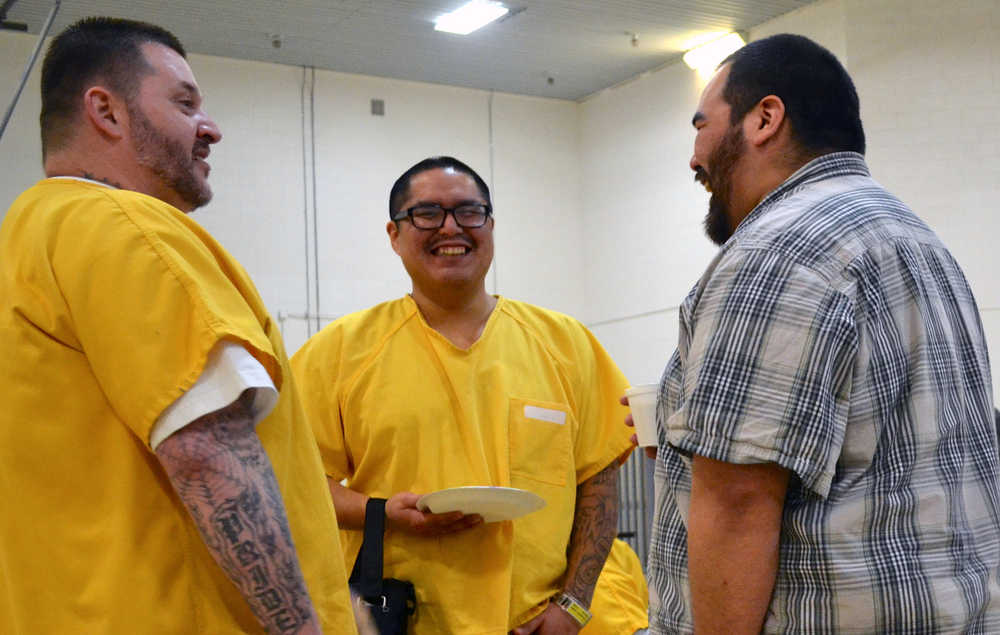Juneau District Court Judge Keith Levy didn’t pull any punches while speaking to about 50 inmates in the Lemon Creek Correctional Center Saturday morning.
“When you get out there’s going to be some jerk who’s not going to help you or treat you with respect,” he told the crowd of male and female inmates sitting in the bleachers of the prison gym. “I can’t stop that.”
But that doesn’t mean he isn’t trying to help them with the difficult transition back into life beyond bars. Saturday marked the ninth annual Success Inside and Out conference, which Levy helped to organize.
He and about 35 other community members ranging from elected officials — Sen. Dennis Egan, Rep. Sam Kito III and Lt. Gov. Byron Mallot — to employment councilors and addiction specialists all gathered on the prison’s basketball court to inspire and aid inmates as they begin preparing to be released.
Most of the inspiration, however, seemed to come from former inmates who returned to the prison to offer advice for their past peers. And like Levy, they left their rose-tinted glasses at home.
“I’m not going to sugar coat it, it’s not going to be easy, but it can be done,” said Brandon Johnson, a former LCCC inmate who has been out for about two years.
Johnson was one of five panelists, all former inmates, who sought to use their stories to prove that successful reintegration into the community outside LCCC is possible. But every speaker also noted the harsh realities of rising recidivism rates. They all had been in and out of the prison system themselves.
“I’ve been doing this since I was 15,” said panelist Charles High. “I grew up in here. I watched my kids grow up in here. It’s not all peaches and cream when you get out, and everybody knows that.”
Life-shattering though it may be, the experience of High and his fellow panelists is not unusual. As many as 27 percent of convicted felons will be arrested within a year of release, according to a 2011 study from the Alaska Judicial Council. And the reasons why are numerous.
Housing and employment both become much more difficult to obtain once people have to check yes on the “convicted felon” box, a prominent feature of many job and rental applications. If that wasn’t enough, many former inmates, including all five of the panelists, struggle with addiction of some form or another.
Trevor Kellar works for the Glory Hole Shelter’s outreach program and spoke with inmates Saturday about securing housing after their release. Though he said former inmates are welcome at the Glory Hole, he advised anybody with substance abuse problems to keep their distance.
The Glory Hole strictly prohibits any illicit substances, but this doesn’t mean that it turns away people struggling with addiction, and Kellar warned that this might make it easier for former inmates to gain access to drugs and fall into old habits.
During his speech, Johnson made a similar warning for the inmates, some of whom he said he knew and loved. One of the biggest keys to his success, he said, was removing harmful influences from his life. This was also one of the hardest things he had to do though, as it meant distancing himself from friends and in some cases even family members. In the end though, it was worth it, he said.
“What kind of bird doesn’t fly? The jail bird,” Johnson said. “But we can do it. We can make that change, and it starts right here.”
LCCC inmate James Hillyer attended Saturday’s event and said that it was comforting to see how many community members were there to help the inmates begin their difficult journey. Hillyer hopes to be out by this time next year, and he has already started thinking about how he is going to avoid ending up back in prison.
“I don’t think anybody can say they’re ready until the rubber hits the road and they are out of here, but I’m going to do the best I can; that’s all I can do,” he said.

